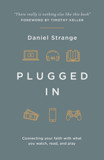
The following piece is an extract from Dan Strange’s new book Plugged In: Connecting your faith with what you watch, read, and play.
We live in a world of constant information.
Just think about your day so far. Here’s how my morning looked…
Alarm turns on the radio: government minister being grilled over education policy.
Walk the dog, headphones firmly in, listening to a film review podcast.
Make the kids packed lunches with radio in background, trying to stop our youngest from activating Alexa and playing the Power Rangers theme tune at earbleeding levels. (Tell me: Why is it, when I shout, “Alexa, stop”, she doesn’t, but when my kids tell her to stop, she immediately does?)
Scan the news app: politics, economy, sport, economy, politics.
Check the weather app: rain.
I’ve only been awake for forty-five minutes and already my senses have been subjected to a barrage of information.

Enjoy culture in a way that feeds your faith and helps you share it with others.
Technology experts have stated that the amount of recorded information generated from the dawn of humanity to 2003 was in the order of 5 exabytes of data, where an exabyte indicates 1000000000000000000 bytes. From 2003 to 2010, we generated an additional
5 exabytes. By 2018, 90% of the world’s data had been generated in the previous two years alone. When you consider that 400 hours of new video is uploaded to YouTube every minute, it’s hardly surprising. That’s a lot of prank videos to get through.
But people don’t take on information as bytes. Our smartphones might be downloading bytes of information, but our brains aren’t—the unit our minds and hearts operate in is stories. Now when I say “stories”, I don’t mean the sort of stories you were taught to write in school, with a beginning, a middle and an end (usually a very predictable one). These stories are all the experiences, feelings, imagination and ideas that we communicate from one human being to another. We read them in the newspaper, we watch them in the cinema, we hear them sung from the car stereo, we glance at them on Instagram, we frame them in our homes.
All of us spend a lot of our waking moments taking in, and telling, these cultural stories. Recent research showed that the average American consumes over ten hours of media every day. It’s thought that you’ll spend seven and a half years of your life watching TV, and over five years on social media. But there are so many hours in a day, right? No wonder that it’s been said of the TV streaming service Netflix that their greatest competition isn’t another company but the human need for sleep.
Yet many of us find this barrage of information overwhelming, at least some of the time. And for Christians, there’s an added question: how do we know what’s right? As followers of Jesus, we want to think, speak and act in a way that honours him. We want to “set [our] minds on things above” (Colossians 3 v 2), but in reality, most of the time our minds are submerged in a constant stream of stories. The problem is not that these cultural stories are bad in and of themselves; it’s more that we’re ill-equipped to know quite what to make of them. How does what I watch on a Saturday night link with what I hear at church on a Sunday morning? We barely begin to think about it before the next thing starts on autoplay. So more often, we just don’t.
It is possible to engage with culture in a way that’s truthful and gracious, not angry and self-righteous. It’s possible to consume culture without either being bewitched by it—buying into everything it tells us—or bewildered by it. It’s possible to watch TV and read novels and play video games in a way that actually feeds our faith rather than withers it. It’s even possible for you—yes, you—to be that person who starts off talking to a friend about last night’s football and ends up talking about Jesus.
It’s possible to consume culture without either being bewitched by it or bewildered by it
So what do we do? I think many Christians respond to culture in one of three ways (and the rest of us respond in a mixture of all three).
Some of us just want to “look in”. We stick our heads in the sand, get into our holy huddle and Christian bubble, and hang on for dear life. We put our fingers in our ears so that we can’t hear the noise outside, while at the same time singing loudly to one another about Jesus coming back soon when all the outside stuff will go away. Until then, we keep ourselves safe from worldly influences by only ever reading Amish romance novels or the latest releases from our favourite celebrity pastor. If we were in therapy, this would be called our sanctified “flight” response.
Some of us instinctively “lash out”. This is our sanctified “fight” response. We get all huffy, red-faced and fingerpointy at the culture around us. Or we just tut and roll our eyes at sex scenes in films or the bad language on TV. At its worst, our healthy belief in judgment turns into an ugly judgmentalism. Our proclamation of the good news of Jesus is heard as a rant on morality. And then we wonder why people “out there” don’t want to come and be with us “in here”.
Then, some of us end up “looking like”. Whatever the motivation, our lives—and our cultural diets—are indistinguishable from the neighbour’s next door, and our churches end up looking not much different from the local sports club. Maybe it’s a well-intentioned drive to be “relevant”. Maybe it’s a reaction against judgmentalism. Maybe it’s simply an indulgence of our sinful nature. Whatever it is, we struggle to be recognised as “a chosen people, a royal priesthood, a holy nation, God’s special possession” (1 Peter 2 v 9). We have become experts at conforming “to the pattern of this world” when we’ve expressly been told not to (Romans 12 v 2).
Look in, lash out, look like: which response are you most prone to?
Let me suggest that there is another way—and that’s what this book is all about. Because it is possible to be truly “in” the world instead of “looking in”—without being “of” the world and looking like it. It’s possible to engage with culture in a way that’s truthful and gracious, not angry and self-righteous. It’s possible to consume culture without either being bewitched by it—buying into everything it tells us—or bewildered by it. It’s possible to watch TV and read novels and play video games in a way that actually feeds our faith rather than withers it. It’s even possible for you—yes, you—to be that person who starts off talking to a friend about last night’s football and ends up talking about Jesus. And that’s what this book will equip you to do. It will help you to process the cultural stories you hear every day. I want to give you the confidence to think about and speak about culture in a way that points people to a bigger and better reality: the story of King Jesus and his cosmic plan for this world. Because you can’t escape culture. But you can engage culture.
This is an extract from Dan Strange’s new book Plugged In: Connecting your faith with what you watch, read, and play. You can pick up a copy here.